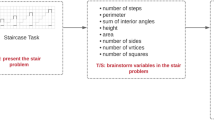Abstract
The paper examines some characteristics of learning events of a community of mathematics educators. Participation in the community entailed gaining familiarity with agreed upon conventions, goals, and forms of communication. The case discussed herein is an attempt to convey the complexities underlying learning in such a community through (re)negotiation of practices and goals. The notion ofreflective discourse is borrowed to describe a group discussion involving collective reflection that constituted an occasion for meaningful learning.
Kurzreferat
Im Beitrag werden einige Charakteristika von Lernereignissen in einer Gemeinschaft von Mathematiklehrer(inne)n untersucht. Die Arbeit in der Gemeinschaft unterstützt, mit vereinbarten Konventionen. Zielen und Kommunikationsformen vertraut zu werden. Die im Beitrag diskutierte Fallstudie versucht die Komplexität aufzuzeigen, die einem Lernen durch Aushandlungen von Praxis und Zielen in solch einer Gemeinschaft zugrundeliegt Mit Hilfe des Begriffs desreflektiven Diskurses soll eine Gruppendiskussion mit kollektiver Reflexion beschrieben werden, die Möglichkeiten für bedeutsames Lernen schafft.
Similar content being viewed by others
References
Arbaugh, F. (2003): Study groups as a form of professional development for secondary mathematics teachers.—In: Journal of Mathematics Teacher Education, 6(2).
Ball, D. L. (1997): Developing mathematics reform: What don’t we know about teacher learning—but would make good working hypotheses.—In: S. N. Friel; G. W. Bright (Eds.), Reflecting on our work: NSF teacher enhancement in K-6 mathematics. Lanham, MD: University Press of America, Inc., p. 77–111.
Bell, B; Gilbert, J. (1994): Teacher Development as Professional, Personal, and Social Development.—In: Teaching and Teacher Education 10 (5), p. 483–497.
Brown, J. S.; Collins, A.; Duguid, P. (1989): Situated cognition and the culture of learning.—In: Educational Researcher 18(1), p. 32–42.
Cobb, P.; Boufi, A.; McClain, K.; Whitenack, J. (1997): An approach for supporting teachers’ learning in social context.— In: Journal for Research in Mathematics Education 28(3), p. 258–277.
Cobb, P.; McClain, K. (2001): An approach for supporting teachers’ learning in social context—In: F.-L. Lin, T. J. Cooney (Eds.) Making sense of mathematics teacher education. Dordrecht, The Netherlands: Kluwer Academic Publishers, p. 207–231.
Cooney, T. J.; Krainer, K. (1996): Inservice mathematics teacher education: The importance of listening.—In: A. J. Bishop; K. Clements; C. Keitel; J. Kilpatrick; C. Laborde (Eds.) International handbook of mathematics education Dordrecht, The Netherlands: Kluwer Academic Publishers, p. 1155–1185.
Cooney, T. J.; Shealy, B. E. (1997). On understanding the structure of teachers’ beliefs and their relationship to change.—In: E. Fennema, B. Scott-Nelson (Eds.) Mathematics teachers in transition Mahwah, NJ: Lawrence Erlbaum Ass. p. 87–109.
Dewey, J. (1933): How we think: A restatement of the relation of reflective thinking to the educative process.—Boston: D.C. Heath and Co.
Erickson, G.; Mayer-Smith, J.; Rodriguez, A. (1994): Perspectives to teach science insights and dilemmas from a collaborative practicum project.—In: International Journal of Science Education 16(5), p. 585–597.
Gellert, U. (2003): Researching teacher communities and networks. —In: Zentralblatt für Didaktik der Mathematik 35(5), p. 224–232.
Hennessy, S. (1993): Situated cognition and cognitive apprenticeship: Implications for classroom learning.—In: Studies in Science Education 22, p. 1–41.
Jaworski, B. (1994): Investigating mathematics teaching: A constructivist enquiry.—London Falmer Press.
Krainer, K. (2001) Teachers’ growth is more than the growth of individual teachers: The case of Gisela.—In: F.-L. Lin; T.J. Cooney (Eds.), Making sense of mathematics teacher education. Dordrecht, The Netherlands: Kluwer Academic Publishers, p. 271–293.
Krainer, K. (2003): Teams, communities and networks (editorial). —In: Journal of Mathematics Teacher Education 6(2), p. 93–105.
Laborde, C. (2001): The use of new technologies as a vehicle for restructuring teachers’ mathematics.—In: F.-L. Lin; T.J. Cooney (Eds.), Making sense of mathematics teacher education. Dordrecht, The Netherlands: Kluwer Academic Publishers, p. 87–109.
Lachance, A.; Confrey, J. (2003): Interconnecting content and community: A qualitative study of secondary mathematics teachers.—In: Journal of Mathematics Teacher Education 6(2), p. 107–137.
Lave, J.; Wenger, E. (1991): Situated learning Legitimate peripheral participation.—Cambridge: Cambridge University Press.
National Council of Teachers of Mathematics (NCTM) (2000): Principles and standards for school mathematics.—Reston, VA: Author.
Rogoff, B. (1990): Apprenticeship in thinking: Cognitive development in social context—New York: Oxford University Press.
Roth, W.-M. (1998): Designing communities.—Boston: Kluwer Academic Publication.
Schön, D. A. (1983): The reflective practitioner: How professionals think in action.—New York: Basic Books.
Schwan Smith, M. (2001) Practice-based professional development for teachers of mathematics.—Reston, VA: National Council of Teachers of Mathematics.
Stein, M.; Brown, C. (1997): Teacher Learning in a Social Context: Integrating Collaborative and Institutional Processes with the Study of Teacher Change.—In: E. Fennema; B. Nelson (Eds.), Mathematics teachers in transition. Mahwah, NJ: Lawrence Erlbaum Associates, p. 155–191.
Steinbring, H. (1998): Elements of epistemological knowledge for mathematics teachers.—In: Journal of Mathematics Teacher Education 1(2), p. 157–189.
Tirosh, D.; Graeber, A. O. (2003): Challenging and changing mathematics classroom practices.—In: A.J. Bishop; M.A. Clements; C. Keitel; J. Kilpatrick; F.K.S. Leung (Eds.), Second International Handbook of Mathematics Education Dordrecht, the Netherlands: Kluwer Academic Publishers, p. 643–687.
Yerushalmy, M.; Chazan, D.; Gordon, M. (1990): Mathematical problem posing: Implications for facilitating student inquiry in classrooms.—In: Instructional Science 19, p. 219–245.
Zaslavsky, O.; Chapman, O.; Leikin, R. (2003): Professional development in mathematics education: Trends and tasks.— In: A. J. Bishop; M. A. Clements; C. Keitel; J. Kilpatrick; F. K. S. Leung (Eds.), Second International Handbook of Mathematics Education. Dordrecht, the Netherlands: Kluwer Academic Publishers, p. 875–915.
Zaslavsky, O.; Leikin, R. (2004): Professional development of mathematics teacher educators: Growth through practice.— In: Journal of Mathematics Teacher Education 7(1), p. 5–32.




